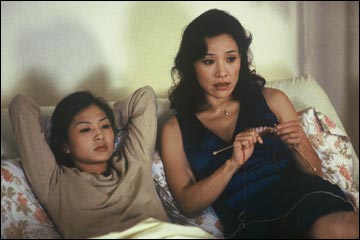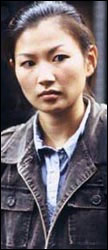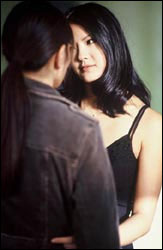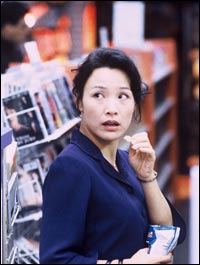We're a Happy Family: "Saving Face"
Saving Face (2005, Dir. Alice Wu)

You'll never catch me dissing a first-time filmmaker, especially one with no formal film school training, who decided to adapt a treatment for a novel to a script, and found herself directing a film starring Joan Chen, with backing from Will Smith, of all people. And as the cherry on top, how about raves at Sundance and the Asian American Film Festival? Such is what happened to Alice Wu, who was a guest at the screening of her film, Saving Face, at the Albany Twin in Berkeley Sunday night. Besides the usual asinine Q&A questions that northern California audiences seem to specialize in ("Why do you have your two most compelling characters smoke cigarettes?" Yes, we are on Planet Earth), the session with 35-year old director Wu after the movie was refreshing and genial, as she expounded on her lesbian identity, her intention for the film to be a valentine to her mother and an antidote to her middle-age malaise, and the touching episode in which her mother took all her friends to see the movie -- the ultimate signifier of parental approval.
Saving Face is a canny mix of universal concerns (acceptance by your elders, the potential for fresh starts and new perspectives even in the midst of middle age) and the culturally specific (Asian-American traditions versus modernity, the Chinese-American "scene" in Flushing, New York). It's also a light dramatic comedy with a remarkably polished look (considering it was shot in less than a month on a $2 million budget), an uncluttered plot, and a healthy sense of self-deprecating humor -- worth seeing if you have any interest in contemporary Asian-American cinema.
 The film centers on Wilhelmina “Wil” Pang (Michelle Krusiec), an overachieving, overworked surgeon who develops a crush on free-spirited ballet dancer Vivian (Lynn Chen). As the two carry on a roller-coaster affair, matters are complicated when Wil's widowed 48-year old mother (Joan Chen) is discovered to be pregnant, and summarily thrown out of her grandparents' home. Outcasts in their own ways, the two share rooms and an uneasy detente in Wil's apartment, both hoarding secrets from the world and each other (the identity of the man who has fathered Ma's kid, Wil's lesbian proclivities). Secondary characters bounce off these two main plots, including frightful would-be suitors with designs on Ma, an African American neighbor who ends up getting hooked on Chinese soap operas, a Greek chorus of hair salon denizens who click their tongues disapprovingly at Mom's antics -- and we haven't even mentioned the fact that the head surgeon at Wil's hospital happens to be Vivian's father ...
The film centers on Wilhelmina “Wil” Pang (Michelle Krusiec), an overachieving, overworked surgeon who develops a crush on free-spirited ballet dancer Vivian (Lynn Chen). As the two carry on a roller-coaster affair, matters are complicated when Wil's widowed 48-year old mother (Joan Chen) is discovered to be pregnant, and summarily thrown out of her grandparents' home. Outcasts in their own ways, the two share rooms and an uneasy detente in Wil's apartment, both hoarding secrets from the world and each other (the identity of the man who has fathered Ma's kid, Wil's lesbian proclivities). Secondary characters bounce off these two main plots, including frightful would-be suitors with designs on Ma, an African American neighbor who ends up getting hooked on Chinese soap operas, a Greek chorus of hair salon denizens who click their tongues disapprovingly at Mom's antics -- and we haven't even mentioned the fact that the head surgeon at Wil's hospital happens to be Vivian's father ...It all sounds wacky and sit-comish, and it is, but in a refreshingly restrained way. The closest the film comes to pure slapstick is a climactic wedding ceremony that is a twist on The Graduate, but apart from that bit of craziness, Wu keeps matters naturalistic, and the actors all do yeoman jobs. Even as it trudges through the cookie-cutter plot twists (on cue, we have our third act crisis, a sudden revelation, the breakup of our main lovers) that plague other films of this ilk, the film maintains a sure, ingratiating pace.
 There's a lot to admire about Saving Face, but setting aside its accomplishments for a few moments, and looking at it with the admittedly jaded eye of a film buff who happens to be Chinese American, I found the film to be fasincating on several problematic levels (how's that for veiled criticism?). It's very indicative that more than a decade after Ang Lee's Wedding Banquet, we're back to the same old story -- a gay couple seeking acceptance from their tradition-bound elders even as they strive to conceal their lifestyle. This says less about Wu's film than it does about a film establishment that seems unwilling to let a major Asian American production expand past the established template (one could argue that Better Luck Tomorrow breaks the mold, but that film merely relocated Boyz in the Hood to Orange County, and spiced it up with pretend-MTV hipness). Wu is at least subliminally aware of this conundrum -- in one amusing vignette, Mom pops down the local video store to find a Chinese movie, only to find shelves full of The Joy Luck Club, The Last Emperor, and Asian porn. This film clearly wants to present itself as a hip, unfettered alternative to those monolithic undertakings, but it isn't necessarily a ground-breaker, either.
There's a lot to admire about Saving Face, but setting aside its accomplishments for a few moments, and looking at it with the admittedly jaded eye of a film buff who happens to be Chinese American, I found the film to be fasincating on several problematic levels (how's that for veiled criticism?). It's very indicative that more than a decade after Ang Lee's Wedding Banquet, we're back to the same old story -- a gay couple seeking acceptance from their tradition-bound elders even as they strive to conceal their lifestyle. This says less about Wu's film than it does about a film establishment that seems unwilling to let a major Asian American production expand past the established template (one could argue that Better Luck Tomorrow breaks the mold, but that film merely relocated Boyz in the Hood to Orange County, and spiced it up with pretend-MTV hipness). Wu is at least subliminally aware of this conundrum -- in one amusing vignette, Mom pops down the local video store to find a Chinese movie, only to find shelves full of The Joy Luck Club, The Last Emperor, and Asian porn. This film clearly wants to present itself as a hip, unfettered alternative to those monolithic undertakings, but it isn't necessarily a ground-breaker, either.More specific to the film, it's clear we haven't quite escaped the whole "model minority" thing yet -- Wil and Vivian are not only good at what they do, they are the best, and labor under parental pressure throughout. At the end of the film, this pressure is presented as benign, but Wu either doesn't have the interest or desire to confront this particular devil in the closet.
She's also not much for subtlety in character interactions. The Wedding Banquet rides hard on the same beats as this film does, but Ang Lee has a surer grasp of the intuitive give-and-take within families, where the silences, furtive looks, and non-explanations are just as important as what is actually said. With Wu, everything rides on the surface. Characters like Grandpa reveal themselves through simple declarative statements ("You have shamed this family") rather than behavior. On a related note, Saving Face has little use for the compromises and negotations that inform family dynamics, as it concludes on an unabashedly optimistic note, every relationship healed, every complication solved, everyone becoming exactly what he or she wants to be without disapproval or ostracization, one big happy family, the end. It works for fairy tales and comedies that aspire only to be the purest fizz of champagne, but for a film that takes a thoughtful, sometimes knotty look at the differences that plague us, it reads more like a cop-out.
Likewise, the parade of clownish suitors who attempt to win Mom's hand are amusing as caricatures (and indeed Wu cheerfully admits that they are nothing more than stereotypes), but contrast that to the passage in Wedding Banquet in which Winston Chao's character throws out impossible standards to his parents for a prospective wife ("PhD, plays an instrument, knows six languages") so as to escape their meddling matchmaking, only to find himself on a date with a woman who fulfills every single requirement -- and to our surprise, we find this woman surprisingly normal. These are subtleties, but they comprise the difference between sit-coms and social comedy.
 The wild card in all this is Joan Chen. It's almost -- almost -- possible to believe her as a frumpy housewife who blooms in her newfound freedom, but with her porcelain face and effortless elegance, she seems like she's beamed in from another world. Her presence provides the film with its one element of dissonance and mystery -- while the other characters end up falling into straitjacketed roles as the film progresses (Wil is the uptight careerist who must "let go" and be honest with herself, Vivian is the free-spirited artist who represents desire), Chen only becomes harder to divine. Wu's characters like to over-talk and pontificate, but Chen shrugs it off with silent bouts of TV-watching, and wistful looks that could suggest regret or greater understanding. Her hidden depths remain hidden until the aforementioned Graduate scene, easily the best passage in the movie, when her secret is revealed. Sitting with Wil at the back of the bus, flush with excitement, her burden lifted, Ma gabs and fusses and effuses. Wil is all but overwhelmed by the torrent of emotion, but still musters enough bravery to be firm with her, for the first time. And suddenly both are silent, both comprehending the changes that must happen for both of them to be happy. In a film that is sometimes content to plod from plot point A to plot point B like assembly-line product, this rarified pause, and Chen's nuanced performance, break the mold.
The wild card in all this is Joan Chen. It's almost -- almost -- possible to believe her as a frumpy housewife who blooms in her newfound freedom, but with her porcelain face and effortless elegance, she seems like she's beamed in from another world. Her presence provides the film with its one element of dissonance and mystery -- while the other characters end up falling into straitjacketed roles as the film progresses (Wil is the uptight careerist who must "let go" and be honest with herself, Vivian is the free-spirited artist who represents desire), Chen only becomes harder to divine. Wu's characters like to over-talk and pontificate, but Chen shrugs it off with silent bouts of TV-watching, and wistful looks that could suggest regret or greater understanding. Her hidden depths remain hidden until the aforementioned Graduate scene, easily the best passage in the movie, when her secret is revealed. Sitting with Wil at the back of the bus, flush with excitement, her burden lifted, Ma gabs and fusses and effuses. Wil is all but overwhelmed by the torrent of emotion, but still musters enough bravery to be firm with her, for the first time. And suddenly both are silent, both comprehending the changes that must happen for both of them to be happy. In a film that is sometimes content to plod from plot point A to plot point B like assembly-line product, this rarified pause, and Chen's nuanced performance, break the mold.


0 Comments:
Post a Comment
<< Home